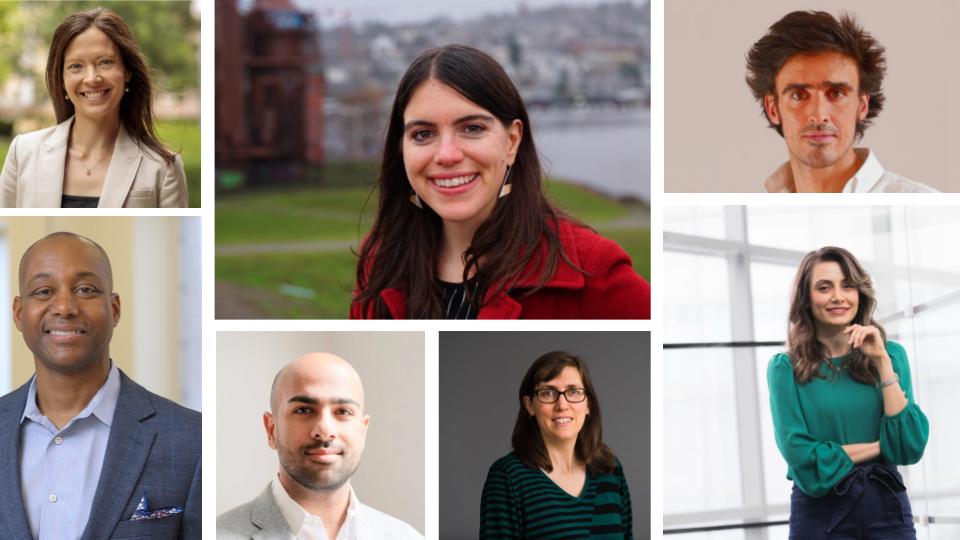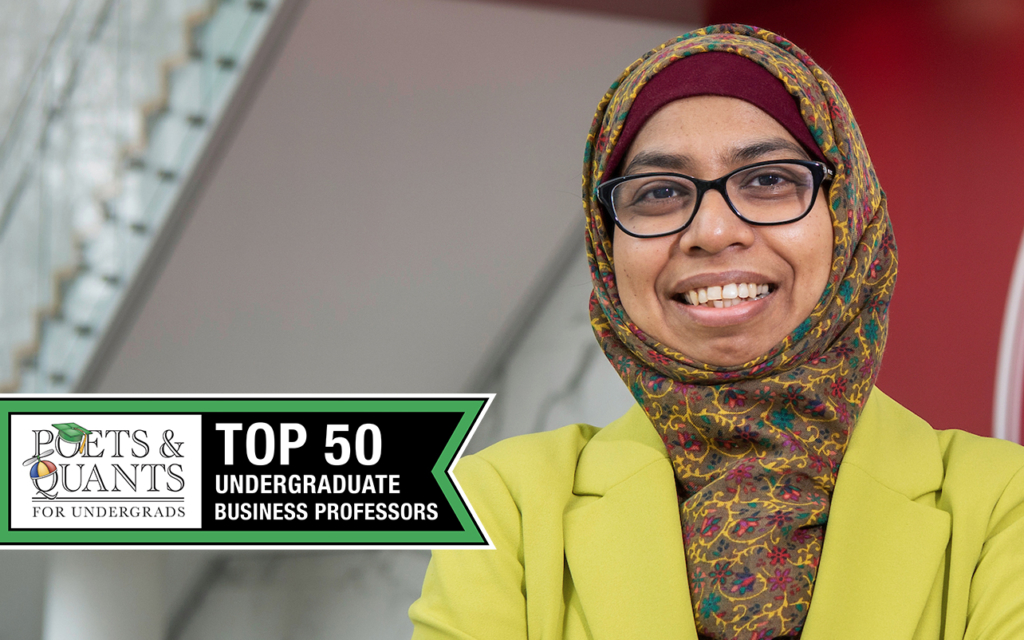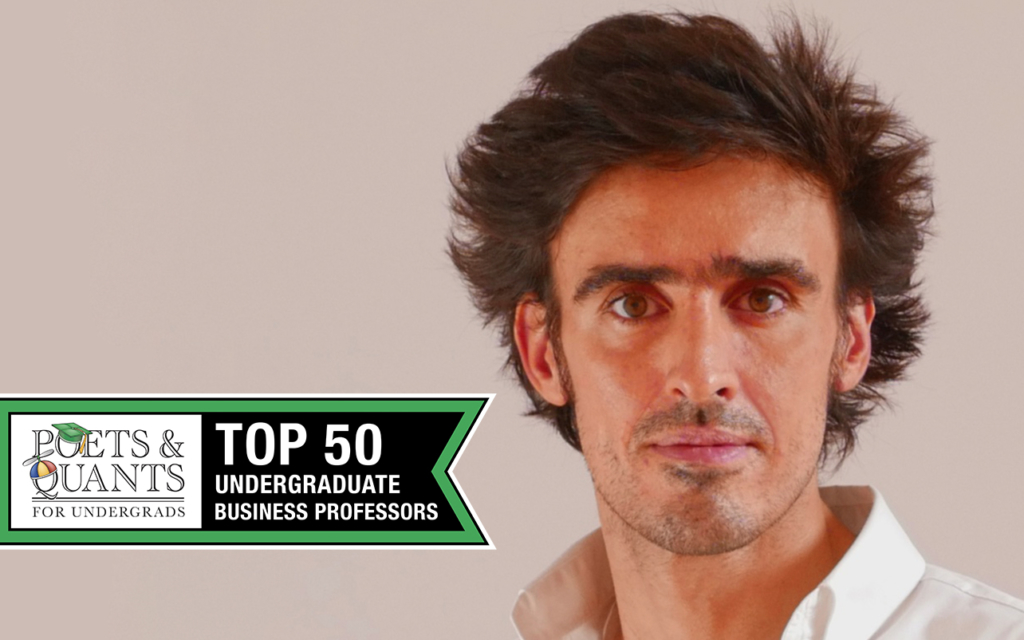
What do top business professors want to see in future business education? We combed profiles of our 2021 Top Undergrad Professors list to find out.
If Mahfuja Malik had her way, the business school of the future would incorporate a curriculum based on social justice alongside the more technical skills at the core of most business programs.
“Our current business education is predominantly focused on honing students’ technical skills and teaching them how to maximize economic benefits or financial profits. However, this has resulted in many students becoming more materialistic and individualistic,” Malik, an associate professor of accounting at the Jack Welch College of Business & Technology at Sacred Heart University, tells Poets&Quants.
“Therefore, it is necessary to incorporate more ethical and moral learning into the business curriculum. Business students should learn more about important contemporary issues such as corporate social responsibility, climate change, diversity and inclusion, workplace equity, passionate leadership, and overall the moral obligations that are intrinsic to being a good global citizen.”

Mahfuja Malik
BUSINESS SCHOOLS FOR GOOD
Last month, P&Q selected Malik as one of 50 Top Undergraduate Professors of 2021. As part of the project, we asked each of the honorees what the business school of the future would look like if it were up to them. Turns out, themes surrounding social justice, social responsibility, and “business for good” weighed heavily on the minds of many of the professors when asked to reimagine business education.
Take Sanjay Laxman Ahire, who wants to see business schools get better at “rebalancing the ‘profit’ motive with ‘doing good.’” The professor of operations and supply chain management at University of South Carolina’s Darla Moore School of Business also would like to see business schools do “a better job at teaching students how to ‘think’, not just learn tools.”
Or Steve DeLoach, the Martha and Spencer Love Professor of Economics at Elon University: “The most interesting and positive trend I have seen over my career has been the increased attention in business to social responsibility. The evolution from the corporate ‘greed is good’ era of the 1980s when I was a student to the increased attention to diversity and inclusion, the environment, social entrepreneurship and corporate social responsibility has been extremely gratifying to see. It makes me proud to work in a business school.’
IMAGINING THE BUSINESS SCHOOL OF THE FUTURE
We ask each and every Top 50 Undergraduate Professor all sorts of questions in order to get to know them: What they’re currently researching? What is most challenging about teaching business students? And what would they be doing if they weren’t business school professors? You can read the full slate of responses here.
We also ask the following: If I had my way, the business school of the future would have much more of this …
For Kevin E. Jackson, associate dean and professor of accountancy at the Gies College of Business at University of Illinois Urbana-Champaign, the answer lies in recognizing the demand of young people to find purpose in their work. “At this point in workforce history, workers are willing to trade off a steady corporate job for work that meets their needs for meaning and purpose,” Jackson writes in his response.
We found the professors’ answers to the future of business school particularly insightful. We’ve collected some of their answers in the story below.
MORE HUMANITY, LESS TECHNOLOGY
Matthew Sooy, assistant professor of accounting at Ivey Business School at Western University in Canada, would like to see less technology and more humanity in future business schools. Technology is changing at light speed in the current business environment, it’s difficult for business schools to keep up with the latest, greatest, and specific skill sets students will need for the future workplace. Instilling softer skills like collaboration will help students throughout their careers.
“No matter what mode that education takes, learning is a very personal and very human experience. It’s often best experienced with others,” says Sooy, winner of Ivey’s David Burgoyne Teaching Award, the Undergraduate Last Lecture, and Case Centre’s Outstanding Case Award Winner.

Saeideh Mirghorbani
Similarly, Saeideh Mirghorbani of Binghamton University envisions more emphasis on humanity and sustainability. “I believe these two issues are the main challenges we currently face, and businesses have had significant roles in causing them,” says the assistant professor of business analytics and operations. “Business students need to be trained about issues such as global warming, forced child labor, gender gap, and racism to be able to manage and improve not only their own businesses but also the entire society. We should train socially responsible managers in business schools!”
And Kate Zipay, assistant professor of management at University of Oregon’s Lundquist College of Business, believes that being a great business leader starts with practicing being a good person. “Having integrity, listening carefully, stepping up, helping out, learning more about the needs of the people around you, trying and failing and trying again—these human practices are critical to successfully navigating the future of work in an increasingly challenging and unpredictable world,” she says.
BUILDING BETTER MORE SUSTAINABLE SOCIETIES
Manuel Arriaga is a clinical assistant professor at NYU’s Stern School of Business and a fellow at Cambridge Digital Innovation. He currently teaches Intro to Programming and Data Science, Dealing with Data, and Programming in Python.
Beyond the classroom, Arriaga is deeply involved in efforts to renew democracies through the power of civic participation.

Manuel Arriaga
“One thing I am particularly proud of is having been credited with inspiring the global social movement, Extinction Rebellion, to include among its three demands the organization of citizens’ assemblies on how societies should respond to the climate emergency,” he tells Poets&Quants. “This ended up leading to the organization of several large-scale citizens’ assemblies on this topic throughout Europe. I see this work, together with my teaching, as my legacy for the younger generation.”
In reimaging the business school of the future, he’d like to see more active lessons in ways to organize economies to be more just and sustainable.
“We have a chance to finally create decent societies for all that no longer rely on constantly threatening a vast majority of the population with material scarcity. Business schools could also play an important role in making sure that, as a society, we develop a much-needed sense of environmental perspective: Providing non-essential goods and services mustn’t get in the way of preserving a viable and healthy planet,” he writes.
Junmin (Jim) Shi agrees: “It is critical to teach our business school students to leverage business approaches in addressing climate-change threats,” says the Hurlburt Chair of Management Information Systems at the New Jersey Institute of Technology. Shi currently teaches highly technical courses in blockchain technology, data-driven financial modeling, and business data analytics, and would like to see more emphasis on issues of climate change and social sustainability in their real-world application.
Next Page: Creating ethical leaders + Entrepreneurial, experiential, adaptable











Questions about this article? Email us or leave a comment below.